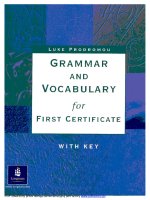grammar and vocabulary for FCE


Grammar and Vocabulary for FCE (Ngữ pháp và Từ vựng thi FCE)
Ngày tải lên: 01/08/2015, 15:31


Grammar And Vocabulary for Cambridge Advanced And Proficiency
Ngày tải lên: 05/10/2012, 08:23



Grammar and Vocabulary for Cambridge Advanced and Proficiency - Adjectives and adverbs
... fuii~ We can also form some adverbs from nouns by adding -1 y: hour hourly part partly Adjectives and adverbs with the same form Some adjectives have the same form when they are adverbs: Adjective ... fine The plane swooped low Some adjectives end in -ly, like monthly and early, and have the same form as adjective and adverb Others can't be transformed into adverbs Ins...
Ngày tải lên: 25/10/2013, 18:20

Grammar and Vocabulary for Cambridge Advanced and Proficiency - Determaners and pronouns
... c that life was rnuch easier and more cornfortable when (18)of thern could utter anything more than 'goo-goo' and 'da-da' and (19) rny wife and ould settle down for a rneal without feeling ... others, or other's Left-handedness is a fascinating phenomenon unless you are trying to undo a knot that a left-handed person has tied the (1) way round It is surprising that left-handers have...
Ngày tải lên: 25/10/2013, 18:20

Grammar and Vocabulary for Cambridge Advanced and Proficiency - Emphasis
... was will-power that enabled me to win sheer full utter c This is the thing was dreading one very sheer INTENSIFYING AND EMPHASISING d Deliberate handball is cheating outright out -and- out comprehensive ... subject When there is no obvious subject for the sentence, we generally use There before nouns or noun phrases and It before adjectives and noun clauses: > Xfs-eekt;tsttm2 J It's c...
Ngày tải lên: 25/10/2013, 18:20

Grammar and Vocabulary for Cambridge Advanced and Proficiency - Linking clauses
... closed down -1 NG CLAUSES We can use an -ing form after (ever) since, after, before, while, when, whenever: Since reading that artide, Colin's refused to eat red meat AJter waitingfor agesfor a table, ... notice Expressing purpose and efect RESULT, CAUSE AND EFFECT Apart from linking clauses, we can express purpose and result in other ways PURPOSE AND INTENTION We can use voc...
Ngày tải lên: 25/10/2013, 18:20

Grammar and Vocabulary for Cambridge Advanced and Proficiency - Modal verbs 1
... Modals come before the infinitive form of a verb without to (except ought to): rnay meet her tomorrow (see Watch out! opposite) Modals never change form They not have -ed, -S, or -ing endings: ... rnay join us Modals never use when forming questions or negatives To form negatives we use not after the modal and before the verb: Will you come? You mustn't worry so much We can use modals wit...
Ngày tải lên: 25/10/2013, 18:20
- test your grammar and usage for fce
- grammar and vocabulary for first certificate with key pdf
- grammar and vocabulary for first certificate chomikuj
- grammar and vocabulary for first certificate luke prodromou
- grammar and vocabulary for first certificate скачать
- grammar and vocabulary for first certificate pearson
- grammar and vocabulary for first certificate answers
- grammar and vocabulary for first certificate download
- grammar and vocabulary for first certificate amazon